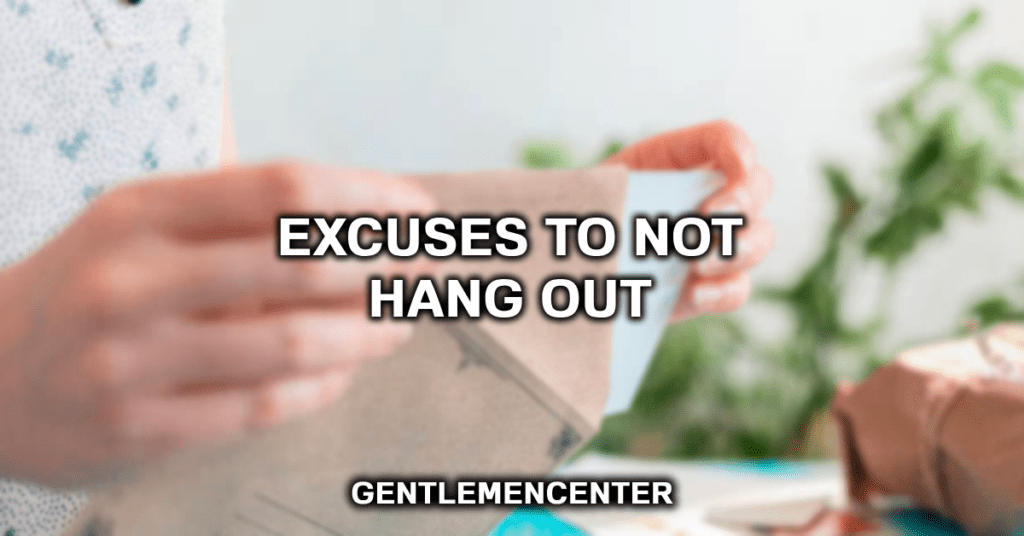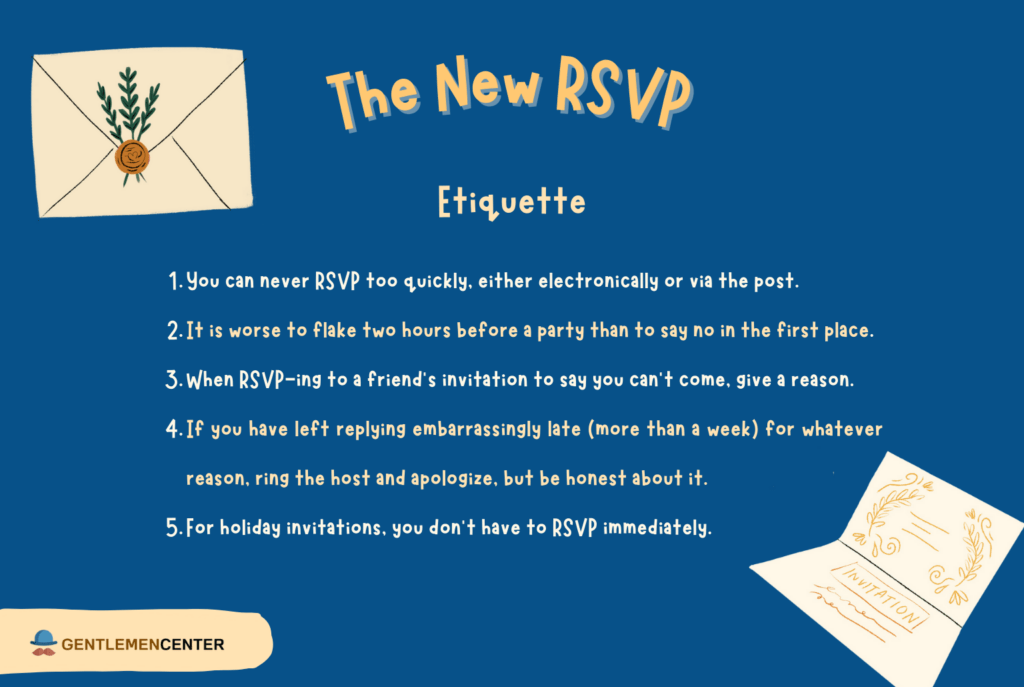There are instances when we may not feel up to hanging out, be it due to prior commitments, exhaustion, or the need for personal time. In such cases, it is essential to communicate honestly without hurting the other party’s feelings.
This blog post discusses various plausible excuses one can use to gracefully decline an invitation.

- What Do You Say When You Don’t Want to Hang Out?
- 10 Good Excuses to Not Hang Out With Someone With Long Explanations
- 10 Bad Excuses and Mistakes to Say When You Don’t Want to Hang Out Detailed explanations
- How to Come Up With Excuses to Not Hang With Friends?
- How to Give an Excuse for Not Going to a Party?
- How to Get Out of a Friend’s Party?
- What Are Some Effective Strategies For Declining An Invitation?
- Why Is Honesty Important When Declining An Invitation?
- What Should You Do If You Consistently Find Yourself Making Excuses To Not Hang Out With Friends?
- How Can You Decline An Invitation Without Damaging Your Relationship With The Person Who Invited You?
- Is It Always Necessary To Provide A Reason When Declining An Invitation?
- How Can You Balance The Need For Personal Time With The Desire To Maintain Your Social Relationships?
- What Can You Do If You Feel Guilty About Declining An Invitation?
- Why Is It Important To Communicate Effectively When You Don’t Want To Hang Out With Someone?
- How Can You Decline An Invitation Without Hurting The Other Person’s Feelings?
- What Are Some Valid Reasons For Not Wanting To Hang Out With Someone?
- Why Is It Advised Against Making Up Excuses Or Lying About Not Wanting To Hang Out?
- What Should One Do If They Find Themselves Consistently Making Excuses Not To Hang Out?
- How Can Setting Boundaries Help In Managing Social Interactions?
- What Are Some Ways To Handle The Guilt That Might Come With Declining An Invitation?
- Conclusion
What Do You Say When You Don’t Want to Hang Out?
It’s crucial to approach the situation tactfully when you don’t want to hang out. Here are some responses that are respectful, considerate, and hopefully, will not lead to any hard feelings:
Work Obligations
A great many of us have had to burn the midnight oil, work on weekends, or deal with an unexpected workload. Saying, “I’d love to join, but I’ve got a major project deadline coming up,” can help convey that you have to prioritize your professional responsibilities.
Personal Commitments
You could be tied up with personal matters. For instance, saying, “I’m sorry, I can’t make it. I have some personal matters to attend to,” is completely acceptable. It’s always okay to maintain your boundaries when it comes to personal commitments.
Health Reasons
Your well-being should always come first. If you’re not feeling well or need some rest, it’s okay to say, “I’m not feeling too well today. I think I’ll stay in and rest.”
Prior Engagements
If you have already committed to another event, it’s perfectly okay to say, “I’m sorry, but I already have plans.” It’s respectful to keep your commitments, and your friends should understand.
Need for Downtime

If you just need some alone time, you can express that as well. A response like, “I think I’m going to take some me-time tonight,” is an honest way to express your need for rest and solitude.
Family Time
Family commitments are also a valid reason to turn down an invitation. You might say, “I have some family stuff I need to handle,” or “We’re having family time tonight.”
The key here is to be respectful and sincere in your response. We all have times when we don’t feel like hanging out, and that’s perfectly okay. Remember, it’s important to take care of your own needs, and sometimes, that means saying no.
10 Good Excuses to Not Hang Out With Someone With Long Explanations
Certainly! Here are ten potential reasons you might use to kindly turn down an invitation, along with some long-form explanations:
1. Professional Obligations
Your career is a significant part of your life, and sometimes it requires more time and attention. Explaining that you have a major project, a tight deadline, or a big presentation can show that you are deeply committed to your job. Make sure to express your regret at not being able to make it, showing that you value your friend’s invitation as much as your work.
2. Health Concerns
You may not be feeling well physically or mentally. It’s essential to prioritize your health and wellbeing over social obligations. Whether it’s a cold, a headache, or you’re feeling overwhelmed and stressed, it’s okay to tell your friend that you need some time to recover and regain your strength.
3. Family Commitments
Having obligations towards your family is understandable. Perhaps you have a close relative visiting, a family dinner, or you need to take care of a sick family member. These commitments are crucial and can be easily understood by others.
4. Financial Restraints
Everyone goes through periods of financial instability. If going out means spending money that you can’t spare at the moment, it’s reasonable to express this. You could suggest a more affordable alternative or plan for a later date when your financial situation is more stable.
5. Need for Personal Time
Everyone needs some alone time to relax, recharge, and indulge in their interests. You can explain that you’ve had a busy period and you need some downtime to enjoy your own company. Most people understand the value of “me time.”
6. Prior Engagements
If you’ve already committed to another plan, event, or obligation, it’s important to honor that commitment. You can express to your friend that you’re already booked and suggest rescheduling.
7. Childcare Responsibilities

If you have children, they can sometimes need your immediate attention. Whether it’s due to a school event, a play date, or simply needing to spend quality time with your child, your friends should understand your need to prioritize your children.
8. Partner Time
Building a strong relationship with your partner requires dedicated time and attention. Explain to your friend that you have set aside the evening for some quality time with your partner, whether it’s a date night or just a quiet evening at home.
9. Study or Learning Commitments
Whether you’re a student or committed to lifelong learning, there are times when you need to prioritize studying. It could be exams, an online course, or personal development reading. This shows that you value growth and education.
10. Home Responsibilities
There are days when household chores pile up, or you may be waiting for an important delivery or repair service. Your home is your personal space, and it’s essential to maintain it. Your friends will understand that there are tasks that can’t be left unattended.
Remember, honesty is generally the best policy. Be polite and considerate in your response, and most people will understand and respect your decision. After all, everyone has been in a similar situation at some point.
10 Bad Excuses and Mistakes to Say When You Don’t Want to Hang Out Detailed explanations
Certainly, when turning down an invitation, it’s important to maintain respect and honesty. Let’s go through some less-than-ideal excuses and the potential pitfalls they present:
1. Blatant Lies
Avoid fabricating a dramatic, false story as an excuse. Your lies may eventually catch up with you, and this could harm your relationship. Moreover, if you’re caught, it can lead to trust issues.
2. Over-Exaggerated Illness
While it’s okay to decline due to health reasons, exaggerating a minor issue or inventing a sickness can backfire, especially if you’re seen in good health shortly after.
3. Ghosting
Ignoring an invitation or not responding at all is disrespectful and can harm your relationship. It’s better to communicate your unavailability, even if the conversation might be uncomfortable.
4. Vague or Non-specific Excuses
Avoid phrases like “Something came up.” These lack transparency and can seem insincere, leaving the other person questioning your intentions.
5. Over-Committing Then Cancelling
Agreeing to plans when you already know you can’t or don’t want to attend, only to cancel later, is inconsiderate. It’s better to be upfront about your unavailability.
6. Inventing Major Personal Issues
Fabricating serious personal problems to get out of socializing can create unnecessary worry and stress for your friends. Plus, it can lead to uncomfortable situations when they find out the truth.
7. Excessive Workload Every Time
While work is a valid excuse, using it repeatedly can make it seem like you’re avoiding the person or event. It’s important to balance work and personal life, and if you’re consistently too busy, it might be time to have a broader conversation about your availability.
8. Faking Emergencies
Pretending an emergency has occurred to get out of plans is dishonest and can cause unnecessary panic. Also, it’s a lie that can easily spiral out of control, leading to more lies.
9. Blaming Others
Shifting the blame onto someone else (“My partner doesn’t want me to go”) can lead to tension between your friend and the person you’re blaming. It’s better to take responsibility for your own decisions.
10. Pretending to Forget the Plan
This can be seen as disrespectful as it implies the plan wasn’t important enough for you to remember. If you genuinely forget, it’s okay, but pretending to forget can damage your friendship.
These types of excuses can harm your relationships and credibility over time. It’s better to decline an invitation gracefully and honestly, while also showing empathy for the person who invited you.
It seems you’re looking for ways to decline invitations from your friends or to avoid going to parties. The most important factor to consider when doing this is honesty. It’s not about crafting the perfect excuse; it’s about communicating your feelings and circumstances effectively and respectfully.

How to Come Up With Excuses to Not Hang With Friends?
When it comes to avoiding hangouts with friends, consider these guidelines:
Reflect on Your Feelings
If you consistently feel the need to make excuses to avoid hanging out, it might be worth exploring why. Is it because you’re overwhelmed, needing personal time, or perhaps it’s the nature of the plans or the people involved? Once you identify the root cause, you can communicate this more effectively to your friends.
Honesty Is Key
Be straightforward about your reasons. If you’re feeling tired or overwhelmed, let your friends know that you need some downtime to recharge. If you’re busy with other commitments, tell them.
Offer Alternatives
If you genuinely want to spend time with your friends but can’t make it due to certain reasons, propose an alternative. Suggest another day, time, or even a different activity. This shows that you still value your friendship and are interested in spending time with them.
How to Give an Excuse for Not Going to a Party?
Avoiding parties can be a bit trickier, especially if it’s a significant event. Here are some tips:
Be Polite and Regretful
Ensure that your tone conveys regret for missing the party. This can be achieved by using phrases such as, “I’m really sorry, but…”
Provide a Valid Reason
This could range from a conflicting commitment, health issues, or personal reasons. Remember, it’s okay not to go into too much detail if you’re not comfortable doing so.
Express Your Gratitude

Make sure to thank the host for the invitation and express your hopes to catch up in a smaller setting or at the next party.
How to Get Out of a Friend’s Party?
If you’ve already agreed to go to a friend’s party and now need to back out, here’s what you can do:
Contact Them Directly
It’s respectful to give them a call or send a personal message rather than a generic, public post.
Apologize for the Change
It’s important to apologize for any inconvenience caused by your last-minute change of plans.
Give a Clear Reason
Be honest about why you can’t make it, but avoid creating an elaborate excuse.
Offer to Make It Up
If it’s appropriate, offer to make it up to them in another way, like taking them out for a meal or hosting them at your place.
Remember, maintaining honesty and respect for others’ time and effort is crucial when declining invitations. It’s okay to say no when you need to, and most people will understand and respect your decision.
What Are Some Effective Strategies For Declining An Invitation?
Effective strategies for declining an invitation include being honest, polite, and straightforward about your reasons. It’s important to convey your message with sincerity, showing regret for not being able to attend. Offering alternatives or promising to make up for the missed hangout or event can also help maintain the relationship.
Why Is Honesty Important When Declining An Invitation?
Honesty is important because it builds and maintains trust within your relationships. If you make up excuses or lie about your reasons for not attending, you risk damaging your relationships, especially if the truth comes out later. Honesty shows respect for your friends and their understanding of your circumstances.
What Should You Do If You Consistently Find Yourself Making Excuses To Not Hang Out With Friends?
If you find yourself consistently making excuses, it’s worth reflecting on why you feel the need to do so. Perhaps you’re overwhelmed, need personal time, or maybe it’s the nature of the plans or the people involved.
Once you identify the root cause, it’s advisable to communicate this to your friends, or consider seeking advice from a counselor or therapist if it’s causing significant distress.
How Can You Decline An Invitation Without Damaging Your Relationship With The Person Who Invited You?

The key to declining an invitation without harming your relationship lies in being respectful and considerate. Express your regret for not being able to attend, provide a clear reason, and thank them for the invitation. It’s also helpful to suggest an alternative plan, showing that you’re still interested in maintaining the relationship.
Is It Always Necessary To Provide A Reason When Declining An Invitation?
While it’s polite to provide a reason when declining an invitation, it isn’t always necessary to go into great detail, especially if it involves personal or sensitive issues. What’s important is conveying your regret and maintaining honesty. If you’re not comfortable disclosing the reason, it’s okay to say that you have personal matters to attend to.
How Can You Balance The Need For Personal Time With The Desire To Maintain Your Social Relationships?
Balancing personal time and social relationships involves clear communication and setting boundaries. It’s crucial to let your friends know that you value your alone time to recharge and relax.
Suggesting alternative plans for when you’re available can also help maintain these relationships. Additionally, understanding and respectful friends will recognize and respect your need for personal time.
What Can You Do If You Feel Guilty About Declining An Invitation?
Feeling guilty about declining an invitation is natural, but it’s important to remember that everyone has their limits, and it’s okay to say no when necessary. If you feel guilty, express your feelings when you decline the invitation and suggest a future plan when you’re available.
Your friends should understand that you can’t be available all the time. If the guilt persists, it may be beneficial to seek advice from a counselor or therapist.
What Should One Do If They Find Themselves Consistently Making Excuses Not To Hang Out?
Consistently avoiding social interactions might indicate deeper issues, such as social anxiety, depression, or problems within the specific relationships. It’s advised to introspect on the reasons behind this pattern. Professional help, such as therapists or counselors, can provide guidance if this behavior causes significant distress.
How Can Setting Boundaries Help In Managing Social Interactions?
Setting boundaries helps manage your time, energy, and comfort levels. It allows you to say ‘no’ when you need to, without feeling guilty or overwhelmed. Communicating these boundaries to your friends helps them understand your needs and can lead to healthier and more respectful relationships.
Conclusion
In conclusion, we all have moments when we need to decline invitations or choose not to hang out. While it might be challenging to communicate this, honesty and respectful communication can help maintain relationships.
It’s essential to remember that it’s okay to prioritize your needs and that setting boundaries is a crucial aspect of any healthy relationship. At the end of the day, a good friend will understand your reasons and respect your decisions.